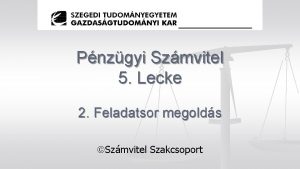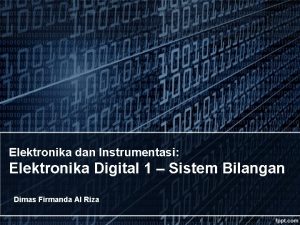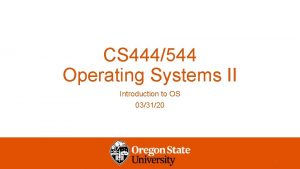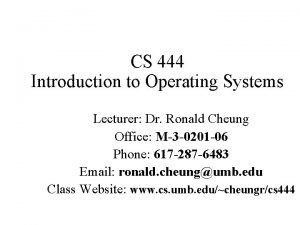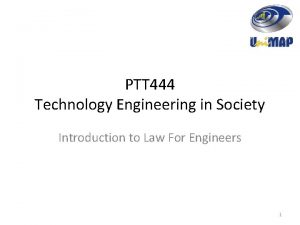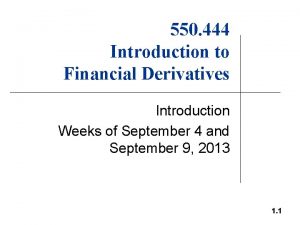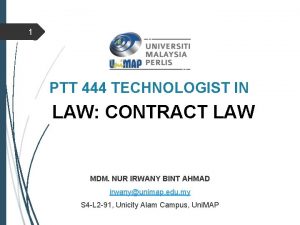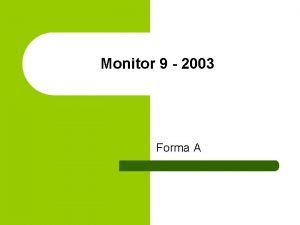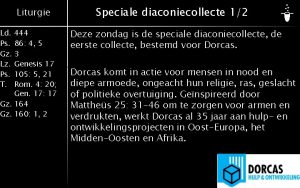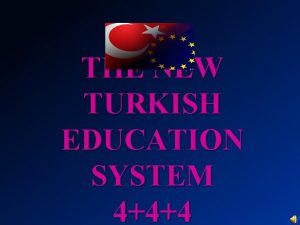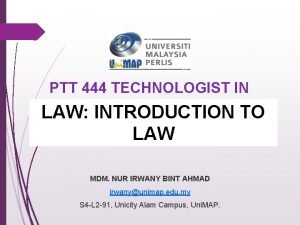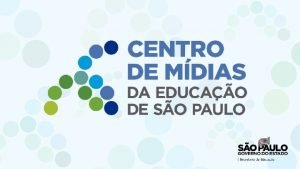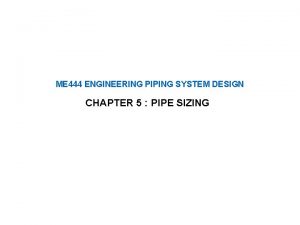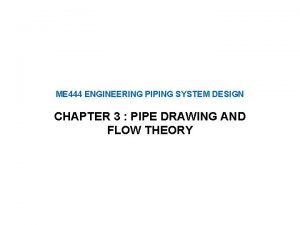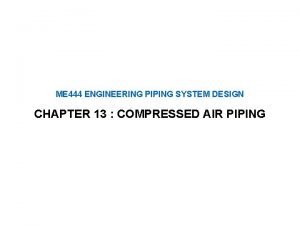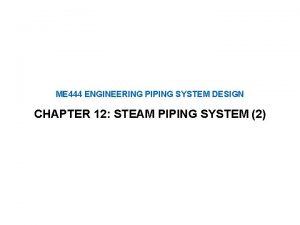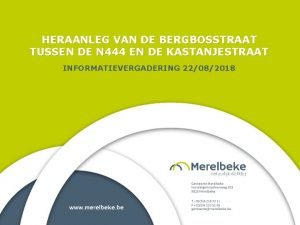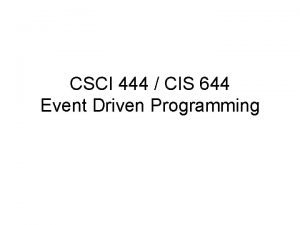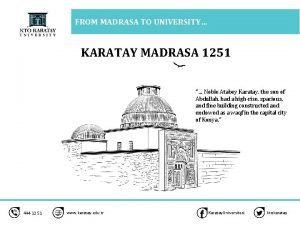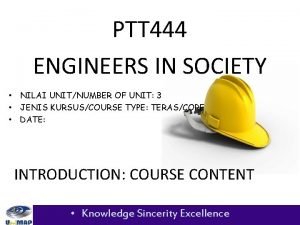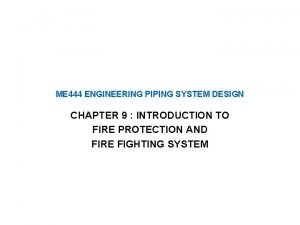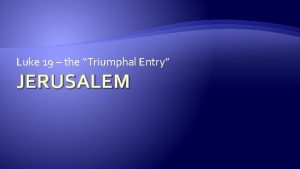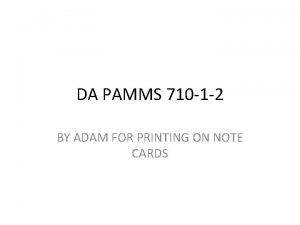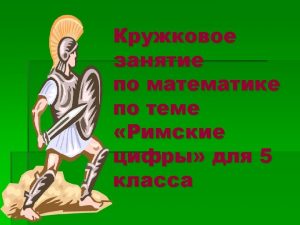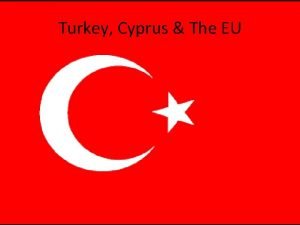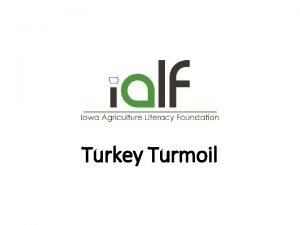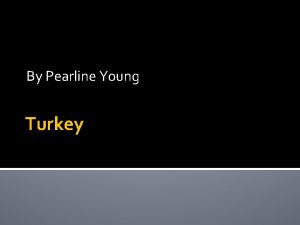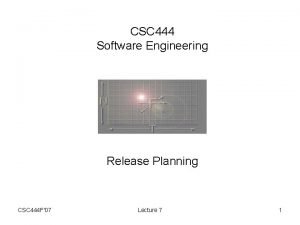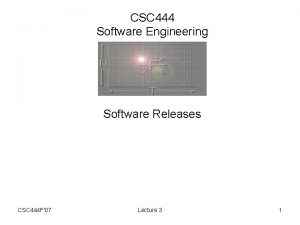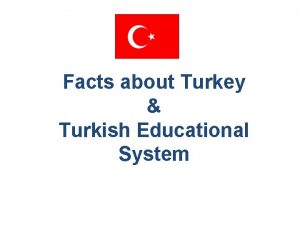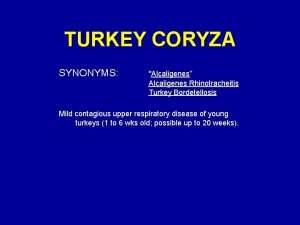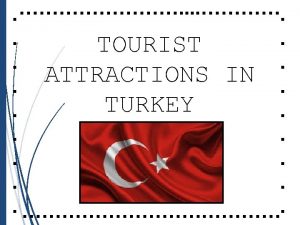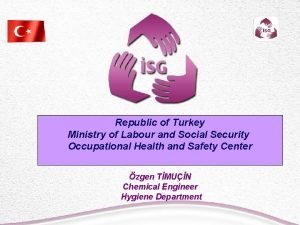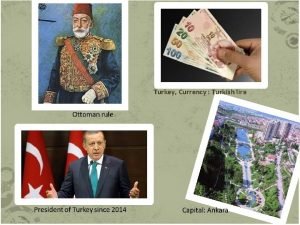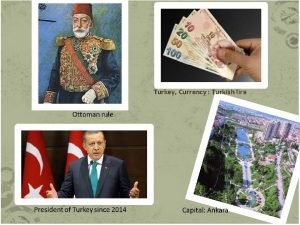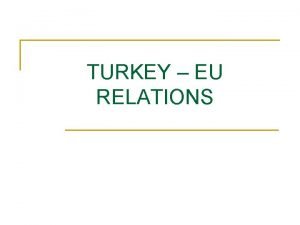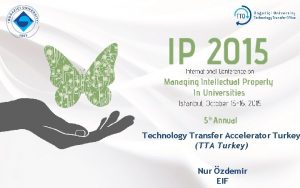The New Education System in Turkey 444 EDUCATION





























- Slides: 29

The New Education System in Turkey 4+4+4 EDUCATION IN TURKEY The New Education System in Turkey 4+4+4 TURKISH EDUCATION SYSTEM

Turkish Education System. . The New School Term in Turkey started 2012 and with the new term starts a new Education System in Turkey which has been called the 4+4+4 system. This system extends mandatory schooling from 8 years to 12 years. The schooling years also sees the introduction of vocational classes starting at 5 th year. Children and Parents can choose from a list of classes, the most controversial class being “The Quran and the Life of the Muhammad” where girls are also permitted to wear their headscarves during these classes. Other classes on offer including Maths, English and Science.

Turkish Education System. . Education in Turkey is governed by a national system which was established in accordance with the Atatürk Reforms after the Turkish War of Independence. Children are obliged to take 12 years of education between the ages of 6 and 18, Annually, about 1. 5 million students graduate from Turkish high schools. About 95% of students attend public schools, but inadequacies of the public system increasingly motivates middleclass parents to seek private education. By 2012 there were over 167 universities in Turkey. Except for the Open Education Faculty (Turkish: Açıköğretim Fakültesi) at Anadolu University, entrance is regulated by a national examination, YGS-LYS, after which high school graduates are assigned to university according to their performance

Turkish Education System. . We also see the change in the starting age for children attending school. Up until this term children would start school around 80 months or between 6 ½ to 7 years. The age for starting school has been lowered to 66 months.

Formal and Non-Formal Education The basic structure of the National Education system is outlined by the Basic Law. The educational system is divided into two main sections as Formal Education Non-Formal Education.

Non-formal education is organized educational activity outside formal systems Informal education is the life-long process in which people learn from everyday experience, informal covers interactions with friends, family, work colleagues, etc Formal education is linked with schools and training institutions

Formal Education Now that the new system of 4+4+4 has been implemented on 12 April 2012 5 years-old: Primary School (ilkokul) begins. School attendance compulsory. 9 years-old: Secondary School (orta okul) begins. Students asked to make pathway choices. School attendance compulsory. Religious high school an option. 12 years-old: Tertiary School (lise) begins. Distance education, religious high school an option.

Pre-Primary Education Pre-Primary education includes the optional education of children between 36 -72 month who are under the age of compulsory primary education. Pre-Primary education institutions, independent nurseries are opened as nursery classes and practical classes within formal and non -formal education institutions with suitable physical capacity. The purpose of Pre-Primary education is to ensure physical, mental and sensory development of children and the acquisition of good habits, to prepare children for primary education, to create a common atmosphere of growth for those living in inconvenient circumstances and to ensure that Turkish is spoken correct and well.

Primary Education The purpose of primary education is to ensure that every Turkish child acquires the basic knowledge, skills, behaviors, and habits to become a good citizen, is raised in line with the national moral concepts and is prepared for life and for the next education level parallel to his/her interests and skills. They have a 3 -year curriculum and prepare children for future higher education. Primary education is compulsory for all citizens, boys or girls, and is given free of charge in public schools.

SBS EXAM (Level Placement Exam) When students start studying the 6 th grade, they start preparing themselves for the national level placement test. At the end of 6 th, 7 th and 8 th grade, each student take this exam and at the end of 3 rd year, according to the total marks of their SBS exams, students choose which high school they would like to study at. After primary education, students have a lot of different choices about the high school that they can go.

After the SBS exam, according to their wish and of course the total marks of their exam results, they may choose to study at; General High scools Vocational High Schools Anatolian High schools Science High schools.

EDUCATION SYSTEM AND TRANSITIONS HIGHER EDUCATION DIPLOMA GRADE 11 GRADE 10 GRADE 9 (COMMON) CERTIFICATE GRADE 12 VOCATIONAL EDUCATION GENERAL SECONDARY EDUCATION GRADE 12 GRADE 11 Make-up Training L A B O R Opportunit y of changing field GRADE 10 CERTIFICATE M A R K E T CERTIFICATE GRADE 9 (COMMON) PRIMARY SCHOOL ADULTS

General High Schools (High School/Lycee) The purpose of secondary education is to give students a minimum common culture, to identify individual and social problems, to search for solutions, to raise awareness in order to contribute to the socio-economic and cultural development of the country and to prepare the students for higher education, for profession, for life and for business in line with their interests and skills.

In these schools, the system of one teacher for each class changes to a specialist teacher for each subject. Students can choose one foreign language from English, French or German. Religious Education lessons, depending on the present government’s policy, is often optional, and is actually a comparative study of religions rather than only of Islam. They have a 4 -year curriculum and prepare children for future higher education.

Anatolian High Schools These were established for the purpose of teaching students at least one foreign language, which they can utilize to further their education in the best possible manner. The educational period inclusive of secondary schooling covers 5 years with a one year preparatory course. (preparatory is up to students’ level of foreign language) Aside from foreign language lessons the normal lycee programme is implemented with science and mathematics lessons given in English.

Science High Schools They give 4 - year education on the fields of Science and Mathematics. Students who got the top points from SBS exam, can be placed in these schools.

Vocational High Schools The tuition period is five years including a one-year preparatory course. Students are taught a minimum of one foreign language in addition to the lessons included in the Science Lycees. The professional industrial training prepares them for higher education and their future work. The programmes in these lycees include training in computers, electricity courses, journalism, construction, mechanics, remote control methods, electronics in medicine, aircraft engines and architecture

In General High Schools and Anatolian High schools; In the beginning of 9 th grade, students have to choose which field they would like to study at for their further education. Options are; Science and Math Social Studies Turkish and Social studies Foreign Languages *** At the end of grade 10 they may choose to change the field of education but later then it won’t be possible to change it.

End Of High School And YGS-LYS EXAM (UNIVERSITY ENTRANCE EXAM) At the end of High school education, students who wish to study at universities, have to take an exam which is called as YGS-LYS exam is based on the fields that students studied during their high school period. The exam is done in one day and lasts for 3. 5 hours. In order to obtain a good future, students want to study in good departments at good universities. This is why they start studying for the entrance exams as much as two years in advance, generally taking private courses as well. The students need to get at least 105 points to have a chance to study at the university.

After the results, students need to make their selections and after, the YOK (High Education Council) place the students starting from the highest points got. As there are more applications than quotas in Universities not everyone could get placed. Generally speaking 1/3 of the students could continue to the university. The others, in case they can afford it continue to the private universities, start working, wait one more year.

University Examination System Approximately 1. 600 000 students enter the university examination per year in Turkiye. 630, 000 students get a chance to enroll any faculty, four or two - year college and open university according to their points. Capacities of Universities in 2006 -2007 year Two-Year Colleges : 200, 000 students Faculties and Four-Year Colleges : 230, 000 students Open University Two-Year Colleges + Four-Year Colleges(faculties) : 600, 000 students

Higher Education in Turkey Higher education includes all educational programmes of at least two years and over. The aim of higher education is to offer education to individuals to meet the demands of the society at various higher levels and to develop scientific research for Turkiye to be a part of the developed countries, by preparing a suitable research environment.

Higher Education in Turkey Each university consists of faculties and four-year colleges, offering bachelor's level programmes, the latter with a vocational emphasis, and two year vocational colleges offering pre-bachelor's (engineering technicians) level programmes of a strictly vocational nature.

There a total number of 60 universities excluding the private universities. Unlike the earlier educational levels, students have to pay a fee of approximately 100 -350 US Dollars per year at public higher education facilities. After four years of study, they may also continue to do masters for one or two years. This is also with an examination and costs a little more

GENERAL STRUCTURE OF HIGHER EDUCATION

Non-Formal Education Parallel to the rapid changes in society, the notion that the essential education is given in schools is also changing. In line with that notion, the Ministry of National Education is making rearrangements in the goals, programs and organizations of the school system, focusing on the development, expansion and restructuring of the non-formal learning and education system within continuing education and shifting the focus of education from formal to continuing (life-long ) education.

Non-Formal Education Non-formal education activities are provided at various formal and non-formal schools and institutions with different programs which include as follows; To teach students reading-writing skills for them to have the opportunity to complete their education. To enable to acquire habits for evaluating their spare time. To prepare them to have the suitable jobs according to the employment needs of the Turkish and Global economy

Non-Formal Education In general, non-formal education consists of General Non-formal Education and Vocational Technical Non-formal Education. The most of the non-formal educational activities take place at Public Training Centers. But There are some private Training Centers.

Non-Formal Education Institutions Public training centers Apprenticeship training centers Practical schools of art for girls Maturation institutes Vocational education centers Technical training centers for adults Education and application schools Private classes Private courses Industrial practical schools of art Science and art centers Open primary education Open high schools Vocational and technical open schools
 444 5 lecke
444 5 lecke 444 555 666 888 33 88 meaning
444 555 666 888 33 88 meaning Cs 444 oregon state
Cs 444 oregon state Cs 444
Cs 444 Ptt 444
Ptt 444 550-444
550-444 444 ptt
444 ptt Ciferny sucet cisla 444
Ciferny sucet cisla 444 Lied 444
Lied 444 444
444 Jamil bin harun v yang kamsiah
Jamil bin harun v yang kamsiah 0 444 fração geratriz
0 444 fração geratriz Piping system design
Piping system design Isometric riser diagram
Isometric riser diagram Me 444
Me 444 Me 444
Me 444 N 444
N 444 444 outline
444 outline Kto uzem
Kto uzem 444 ptt
444 ptt Nfpa 13 sprinkler pipe sizing chart
Nfpa 13 sprinkler pipe sizing chart Artaxerxes decree 444
Artaxerxes decree 444 Artaxerxes decree 444
Artaxerxes decree 444 Da form 5811 r
Da form 5811 r 444 римскими цифрами
444 римскими цифрами /mapi/emsmdb/ mailboxid
/mapi/emsmdb/ mailboxid Hình ảnh bộ gõ cơ thể búng tay
Hình ảnh bộ gõ cơ thể búng tay Slidetodoc
Slidetodoc Bổ thể
Bổ thể Tỉ lệ cơ thể trẻ em
Tỉ lệ cơ thể trẻ em
